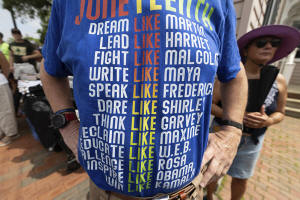Juneteenth celebrations across the US commemorate the end of slavery
[June 20, 2025]
By HOLLY RAMER
PORTSMOUTH, N.H. (AP) — Juneteenth celebrations unfolded across the U.S.
on Thursday, marking the day in 1865 when Union soldiers brought the
news of freedom to enslaved Black people in Texas and attracting
participants who said current events strengthened their resolve to be
heard.
The holiday has been celebrated by Black Americans for generations, but
became more widely observed after being designated a federal holiday in
2021 by former President Joe Biden, who attended a Juneteenth event at a
church in Galveston, Texas, the holiday's birthplace.
Biden said he was proud to sign the law making Juneteenth a federal
holiday because “all Americans should know the weight and power of this
day.”
“Some say to me and you that this doesn't deserve to be a federal
holiday. They don't want to remember what we all remember, the moral
stain of slavery,” he said.
The celebrations come as President Donald Trump’s administration has
worked to ban diversity, equity and inclusion initiatives, or DEI, in
the federal government and remove content about Black American history
from federal websites. Trump’s travel ban on visitors from select
countries has also led to bitter national debate.
In Portsmouth, New Hampshire, Robert Reid waved a large Juneteenth flag
at the city's African Burying Ground Memorial Park, where African
drummers and dancers led the crowd in song and dance. Reid, 60, said he
attended in part to stand against what he called Trump's “divide and
conquer” approach.
“It's time for people to get pulled together instead of separated,” he
said.

Jordyn Sorapuru, 18, visiting New Hampshire from California, called the
large turnout a “beautiful thing.”
“It's nice to be celebrated every once in a while, especially in the
political climate right now," she said. “With the offensive things going
on right now, with brown people in the country and a lot of people being
put at risk for just existing, having celebrations like this is really
important.”
Juneteenth's origins and this year's celebrations
The holiday to mark the end of slavery in the U.S. goes back to an order
issued on June 19, 1865, as Union troops arrived in Galveston at the end
of the Civil War. General Order No. 3 declared that all enslaved people
in the state were free and had “absolute equality.”
Juneteenth is recognized at least as an observance in every state, and
nearly 30 states and Washington, D.C., have designated it as a permanent
paid or legal holiday through legislation or executive action.
In Virginia, a ceremonial groundbreaking was held for rebuilding the
First Baptist Church of Williamsburg, one of the nation’s oldest Black
churches.
In Fort Worth, Texas, about 2,500 people participated in Opal Lee’s
annual Juneteenth walk. The 98-year-old Lee, known as the “grandmother
of Juneteenth” for the years she spent advocating to make the day a
federal holiday, was recently hospitalized and didn’t participate in
public this year. But her granddaughter, Dione Sims, said Lee was “in
good spirits.”
“The one thing that she would tell the community and the nation at large
is to hold on to your freedoms,” Sims said. “Hold on to your freedom and
don’t let it go, because it’s under attack right now.”
Events were planned throughout the day in Galveston, including a parade,
a celebration at a park with music and the service at Reedy Chapel
African Methodist Episcopal Church that Biden attended.
During a Juneteenth speech in Maryland, Gov. Wes Moore announced pardons
for 6,938 cases of simple marijuana possession, which can hinder
employment and educational opportunities and have disproportionally
affected the Black community.
[to top of second column]
|

Paul Wendell wears a Juneteenth themed t-shirt during a Juneteenth
celebration at the African Burying Ground Memorial Park Thursday,
June 19, 2025, in Portsmouth, N.H. (AP Photo/Michael Dwyer)

Moore, a Democrat who is Maryland’s first Black governor and the
only Black governor currently serving, last year ordered tens of
thousands of pardons for marijuana possession. The newly announced
pardons weren’t included in that initial announcement because they’d
been incorrectly coded.
In New Hampshire, Thursday's gathering capped nearly two weeks of
events organized by the Black History Trail of New Hampshire aimed
at both celebrating Juneteenth and highlighting contradictions in
the familiar narratives about the nation’s founding fathers ahead of
next year’s 250th anniversary of the signing of the Declaration of
Independence.
“In a time when efforts to suppress Black history are on the rise,
and by extension, to suppress American history, we stand firm in the
truth," said JerriAnne Boggis, the Heritage Trail’s executive
director. "This is not just Black history, it is all of our
history.”
What Trump has said about Juneteenth
During his first administration, Trump issued statements each June
19, including one that ended with “On Juneteenth 2017, we honor the
countless contributions made by African Americans to our Nation and
pledge to support America’s promise as the land of the free.”
When White House press secretary Karoline Leavitt was asked during
her Thursday media briefing whether the president would commemorate
the holiday this year, she replied, “I’m not tracking his signature
on a proclamation today.”
Later Thursday Trump complained on his social media site about “too
many non-working holidays” and said it is “costing our Country
$BILLIONS OF DOLLARS to keep all of these businesses closed.” Most
retailers are open on Juneteenth, while federal workers generally
get a day off because the government is closed.
New Hampshire, one of the nation's whitest states, is not among
those with a permanent, paid or legal Juneteenth holiday, and Boggis
said her hope that lawmakers would take action making it one is
waning.

“I am not so sure anymore given the political environment we’re in,"
she said. “I think we’ve taken a whole bunch of steps backwards in
understanding our history, civil rights and inclusion.”
Still, she hopes New Hampshire's events and those elsewhere will
make a difference.
“It’s not a divisive tool to know the truth. Knowing the truth helps
us understand some of the current issues that we’re going through,”
she said.
And if spreading that truth comes with a bit of fun, all the better,
she said.
“When we come together, when we break bread together, we enjoy music
together, we learn together, we dance together, we’re creating these
bonds of community,” she said. “As much was we educate, we also want
to celebrate together.”
___
Associated Press writers Jamie Stengle in Dallas and Brian Witte in
Annapolis, Maryland, contributed to this report.
All contents © copyright 2025 Associated Press. All rights reserved |